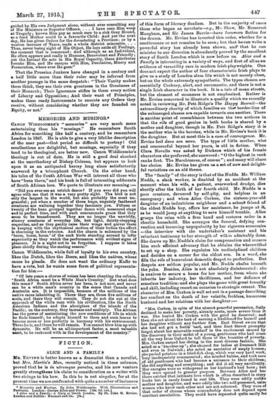MEMORIES AND MUSINGS.*
CANON Wrnmoosnuc's " memories" are very mush more entertaining than his "musings." He remembers South Africa for something like half a century, and he remembers London in 1847. He is able to give a very lifelike description of the near past--that period so difficult to portray! Old recollections are delightful, but musings, especially if they tend to be theological, are better new. Oanon Widdicombe's theology is out of date. He is still a good deal shocked at the unorthodoxy of Bishop Coleneo, but appears to look upon it as an antiquated heresy long since satisfactorily answered by • triumphant Church. On the other hand, his tales of the South African War will interest all those who have "been there," and his book is full of interesting oddments of South African lore. We quote to illustrate our meaning :— "Did you ever see an ostrich drums I' If you ever did you will agree with me that it was a very pretty sight. The bird is not only the largest in the world, but also probably the most un- graceful ; yet when a number of these huge, ungainly feathered creatures are waltsiog together they fascinate you. Fifteen or twenty of the hens grouped together dance with measured stops and in perfect time, and with such consummate grace that they seem to be transformed. They are no longer the unwieldy, clumsy creatures of everyday life, but light, dainty-stepping coquettes, and as they gently raise their wings and quiver them in keeping with the rhythmical motion of their bodies the effect is charming in the extreme. And the chorus is enhanced by the • boom, boom, boom' of the cock birds standing around in lofty superiority as they watch the performance with evident signs of pleasure. It is a eight not to be forgotten. I suppose it takes place chiefly during the mating season."
Canon Widdicombe, while full of loyalty to his own country, likes the Dutch, likes the Boers, and likes the natives, whose cause he pleads. He does not want the ordinary Kaffir to have a vote, but he wants some form of political representa- tion for him:—
" Of late years a chorus of voices has been chanting the refrain,
• South Africa must be a White Man's Country.' But what does this mean ? South Africa never has been, is not now, and never can be a white man's country in the sense that Canada and Australia are. It is impossible, because of the millions of the native races inhabiting it. There they are, those five millions of souls, and there they will remain. They do not die out at the approach of the white man with his civilisation, like the North American Indians and the aborigines of the islands of the Pacific; on the contrary, they increase and multiply. The African lies the power of assimilating the new conditions of life in which ho finds himself ; he adapts himself to them and soon learns to become more or less perfectly in harmony with his environment. There he is, and there ho will remain. You cannot blow him up with ynamite. He will be an all-important factor, a most valuable asset, to be reckoned with in the development of the country."






































 Previous page
Previous page